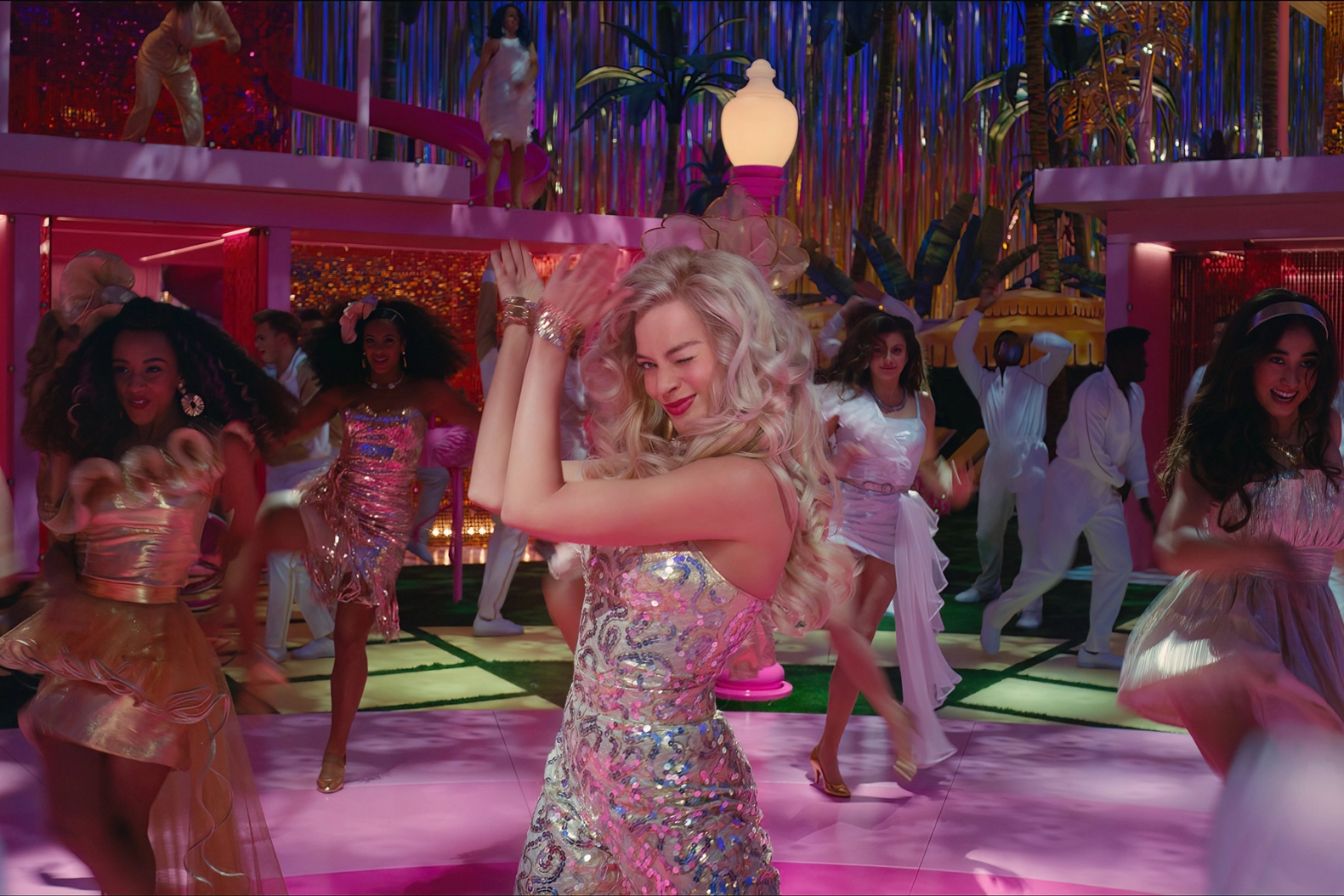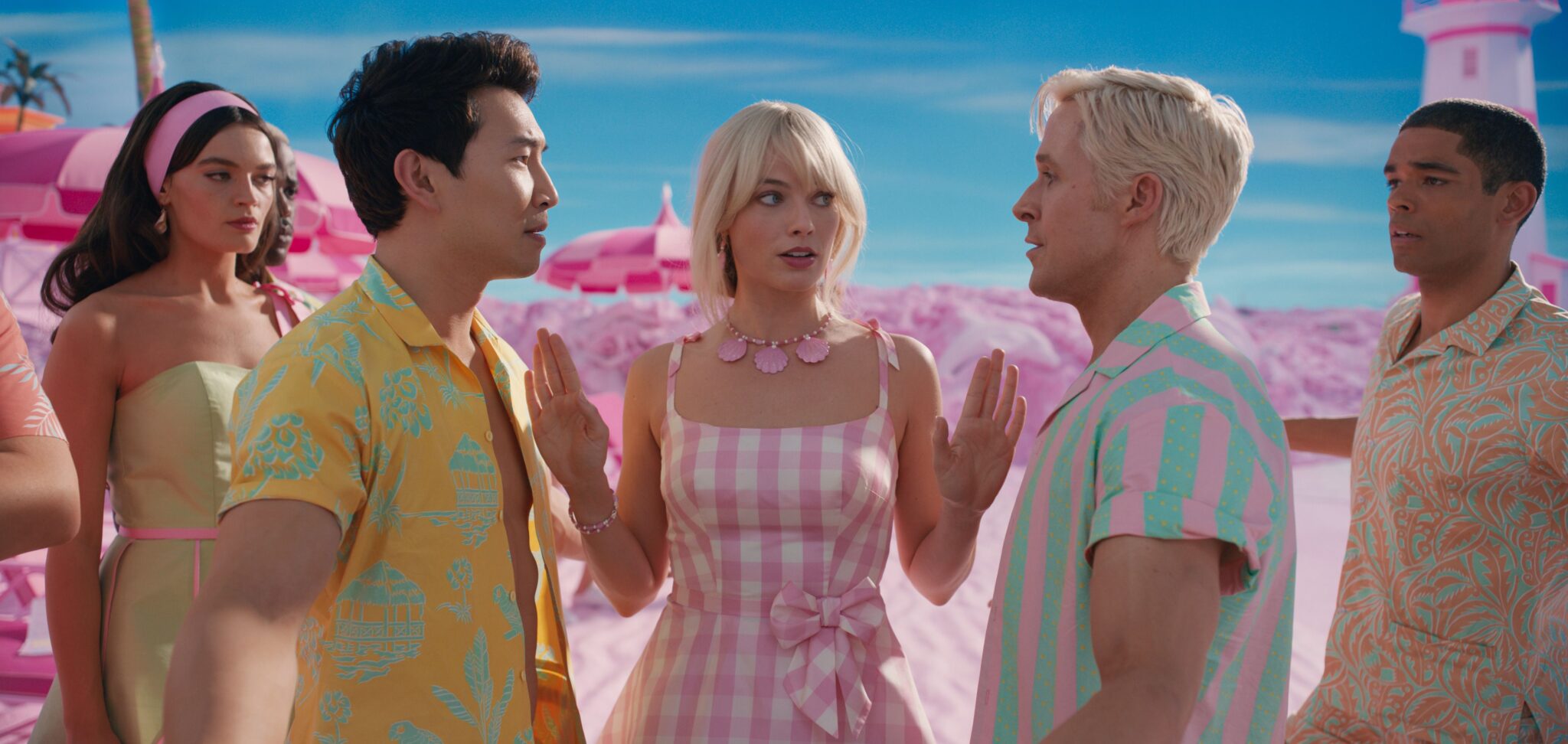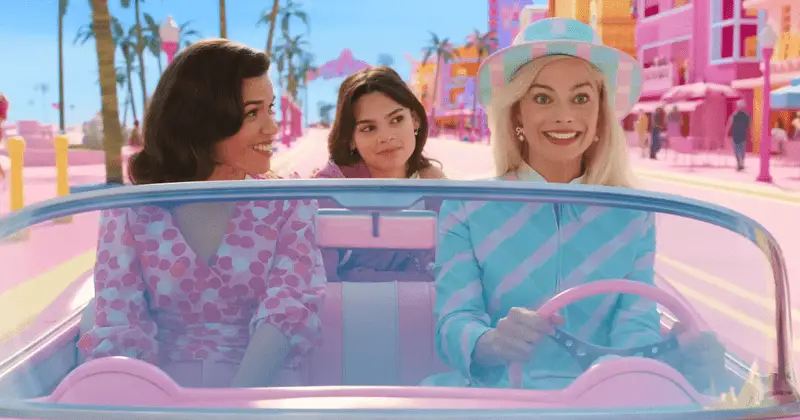Barbie is a doll. Let us start there and work our way forwards. Call it a doll or a toy, it’s something young girls project upon. A blank canvas upon which they can paint with their imagination.
Greta Gerwig could have made a toy commercial rife with tortured mythos and melodrama, ala Transformers. And, in a way, she did. However, she also looked at Barbie for what she is, a woman, and how she is forced through no fault of her own to represent the messy complexities of womanhood. Something that Gerwig, and all women, can relate to. Most blockbusters do well to have a hint of an idea, much less several delivered with passionate clarity.

Anges Varda once said, “Artists invent ways to express our emotions,” which sums up what Gerwig has accomplished with Barbie. In lesser hands, it would have merely been camp-which it still is, but it’s the kind of high camp that feels like a musical without the songs and dances, which it does have a smattering of. Bright, colorful, and decidedly and unashamedly weird, more than anything, Barbie is a movie speaking directly to this moment in time.
A moment in time in which it feels confusing and dark; the shadow of a worldwide pandemic still hangs over us, a Supreme Court dedicated to stripping rights away. If that isn’t enough, our mainstream art has been so busy trying to distract us that it rarely has spoken about the fears and anxieties that we all feel. Thankfully, the script by Gerwig and her partner Noah Baumbach looks not just at womanhood but at the existential dread we all feel and how consuming makes for a bleak and unsatisfactory answer to the towering questions before us.
Gerwig cleverly creates a world of pastels and pinks of plastic confectionery aesthetic to draw attention to the film’s artificiality and a way to draw you into the world of the Barbies. Gerwig and Baumbach aren’t content with letting us keep these weighty themes at arm’s length. Instead, they want the audience to wrestle with them. Making moments where Stereotypically Barbie (Margot Robbie), in the middle of a dance party, asks, “Hey, do you ever think about dying,” so visceral. Yes, it’s darkly funny. But by posing the question directly, Gerwig and Baumbach force the audience to ponder it themselves.
Barbie refuses to allow the audience to sit on the sidelines. Gerwig forces us to participate in the character’s journey. In Gerwig and Baumbach’s hands, death isn’t a symbol; it is a fact of life that must be reckoned with and accepted.
That casting Robbie as Barbie is spot-on is uncontested. But Robbie’s performance is so seamless and effortless that it will be easy to overlook how textured and layered it is. She is playing with a doll, broaching consciousness.; a character who starts as a literal symbol that slowly begins to transform into a real woman.
It is the story of Pinnochio—a search for identity.
The arc of Ken (Ryan Gosling) is absurd and all too horrifying and believable. Yet, Gerwig holds compassion for Ken and all the Kens. She doesn’t excuse their actions but understands their pain. Gosling has long since proven his comedic timing, as anyone who saw The Nice Guys can attest, but here he plays a rarified himbo lost in both the make-believe and the real world. Like Robbie, his is a textured creation, a character of a person searching for purpose.
Of course, at the end of the day, Barbie is a toy commercial paid for and bought by Mattel. Gerwig and Baumbach never hide this fact and, in a way, are more honest about what Barbie is than most blockbusters about their subject. But that Barbie is merely a toy commercial and yet doesn’t shy away from these philsophical ideas and topics only shows how shallow our blockbusters have become.

Gerwig doesn’t deny Barbie is a toy. But she understands the importance of toys in molding who we are. The memories they help create, the imagination they spark, and how the sense of play serves us and protects us from the harsh world. That Gerwig and Baumbach even find a way to pay homage to the creator of Barbie, Ruth Handler (Rhea Perlman), while also using her to comment on life itself is heady, not to mention that they pull it off. It should be noted that seeing Perlman in a big-screen summer movie event felt long overdue. And yes, she crushed her role as a deity-adjacent mentor to Barbie.
But more than anything, what allows Barbie to succeed is Gerwig’s commitment to the playful absurdity of it all. She tells us not to think about it too much in one breath while giving us a syllabus worthy of commentary to mull over. Yet, Barbie never feels clunky or as if it might falter. Granted, at times, it does feel like it drops a plot thread only to pick it up later in an arbitrary manner. I’m thinking about the Mattel CEO, played by Will Ferrell. Still, even here, it never bothered me because Barbie feels like Gerwig using a studio sandbox as an excuse to smuggle in stream-of-consciousness cinema.

Barbie feels less plotted and more like it’s happening as we watch it. It’s movie magic personified. What’s more, the thing that ties it all together is the same thing that unites Gerwig’s directorial efforts: the love between mothers and daughters.
Whether it’s Ladybird, Little Women, or Barbie, Gerwig is entranced by the fraught and thorny relationships between the two, simply because each must navigate a world openly hostile towards them but in a different way. In Barbie, she explores it through Gloria (America Ferrera) and Sasha (Ariana Greenblatt).
Gloria and Sasha love each other deeply, but as Gerwig commented in Ladybird, they have such strong personalities that they often conflict and combat. Gloria may be an adult, but as any adult will tell you, life only gets more confusing the older you get. Sasha is young and can’t understand what everyone is so confused about.
As Ruth says to Barbie, “Mothers have to stand still, so daughters can see how far they’ve come.”
Rodrigo Pietro’s camera brings Barbie to neon life. The way that Barbieland has a specific kind of sheen that reality doesn’t while keeping the same sense of abstract surrealism intact, allows Gerwig to achieve the crucial tonal balance. Gerwig and Pietro find ecstatic truth in the smallest things. The way they frame Barbie telling an old woman she’s beautiful and allowing Barbie to see the older woman as a person-something fully she’s never been viewed as is heartbreaking and heart-soaring.
Gerwig and Pietro use imagery so craftily and adroitly that it makes other blockbusters seem lazy. Moments such as Barbie feeling uneasy about getting back in the box and narrowly escaping being held prisoner in plastic, despite pleading for that very fate a few scenes earlier, is poetry all its own. Barbie is visual jazz, riffing on themes and changing modes but making all the variations seem like one piece.
Barbie means a lot of things to a lot of people. Gerwig understands this and thus makes Barbie herself a crucible of sorts, burning away the capitalist consumerist baggage until only the ode to womanhood and a glorious, almost spiritual celebration of life remains.
In Gerwig’s hands, Barbie isn’t a toy commercial but a love story of mothers and daughters, a love story of learning to love oneself outside societal expectations.
Images courtesy of Warner Bros. Pictures
Have strong thoughts about this piece you need to share? Or maybe there’s something else on your mind you’re wanting to talk about with fellow Fandomentals? Head on over to our Community server to join in the conversation!

